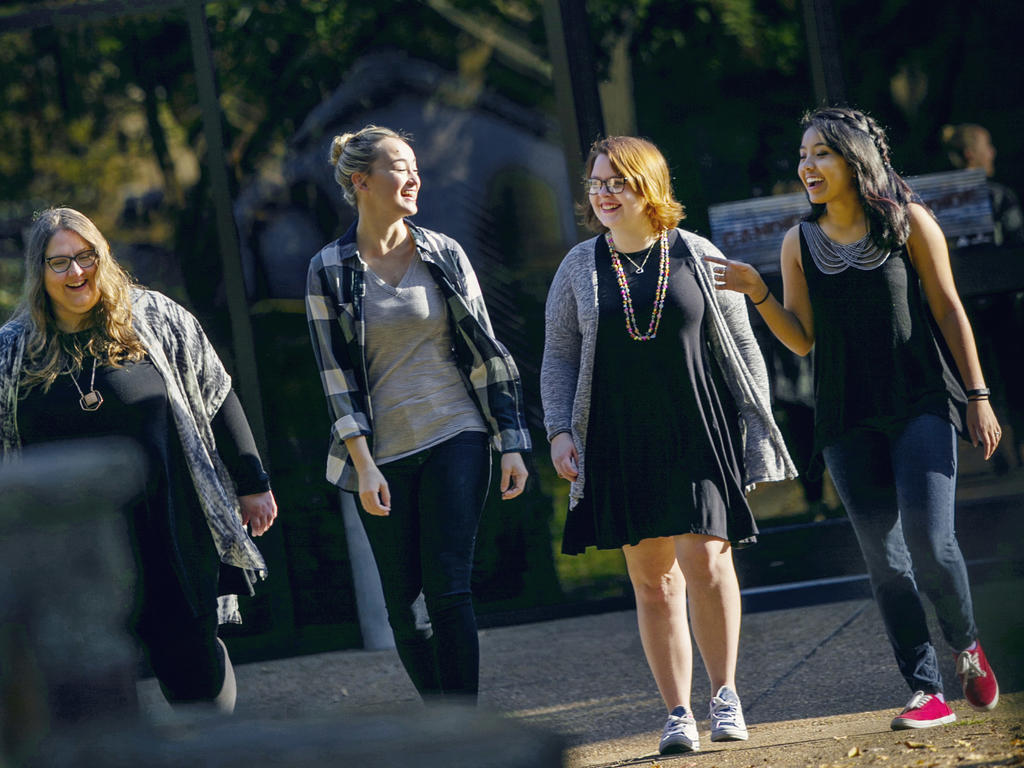Last fall, Theatre Memphis and Rhodes College came together to cultivate the arts through the Central High School Fellowship, funded by the Riea and Steve Lainoff Fellowship Program. As the name suggests, this collaborative effort began with Central, but has now expanded to Hanley Middle School and Melrose High School. In this program, four Rhodes theatre fellows—Miranda Colegrove ’18, Andrea Pajarillo ’18, Brynna Newkirk ’17, and Karissa Coady ’18—work weekly with the students on performance projects at their schools.
Rhodes’ theater department also hired Leslie Barker of Theatre Memphis to act as an on-site expert and to guide the program. “I see myself as a mentor and a resource,” says Barker. “The Rhodes students really lead everything. I am there to help with the big picture, help tackle any obstacles, and answer any questions that they may have.”
Colegrove, Pajarillo, and Newkirk have been lending their theater expertise to the students in Central’s advanced theater class, which consists primarily of upperclassmen, and with the students at Melrose High. The Rhodes students act as a guiding force in the classroom, aiming to develop what the high school students bring to the table. For example,
“Art gives us a way to process all of the stuff we are dealing with in our world—this fellowship gives us a way to do that together.”
—Leslie Barker, Theatre Memphis
Pajarillo, who has been dancing since the age of three, emphasizes movement in performance, and challenges the students to consider how the words on the page physically manifest on the stage.
The Melrose students worked on creating raps and dances. The Central students decided to work on spoken word poetry, focusing particularly on social issues like race, justice, and equality. “They are essentially creating their own pieces,” explains Colegrove, “and we’re just guiding their creativity.” Adds Newkirk, “We had them shout out things they were interested in, frustrated by, overwhelmed with, or that they wanted to know more about.”
A typical day in the Central theater class starts with a warm-up exercise for both body and mind. The students are then divided into their six topic-based groups to work on their poems with the help of the theater fellows. Afterwards, they have the opportunity to share and discuss their projects, which brings new ideas to the table and allows for creative criticism. The seriousness of the topics makes for challenging discussions, which the students tackle with open minds. “Just getting to work with kids who want to be thinking on that level is the coolest thing ever,” Pajarillo adds. “At the end of the day, it’s not just them learning from me. It’s a back and forth dynamic.”
The Central and Melrose students presented their work in the performance Say It Like It Is! at the McCoy Theatre on Dec. 2. They shared the stage with other members of the community, including students from Rhodes. Colegrove, along with theatre fellow Emily Murphy ’18, performed an original poem of their own that illustrates the different ways mental illness can affect individuals. All of the proceeds from the event benefited the Mid-South Peace & Justice Center, an organization that aims to mobilize communities in nonviolent social justice action, which coincides with the messages of the performances.
The students at Hanley Middle School, mentored by Coady, worked on a lighter, more festive performance. They showcased a retelling of A Christmas Carol that replaced the character Scrooge with a mean student who focuses too much on academics, but experiences a change of spirit. Because Hanley does not yet have a theater department of its own, Coady worked with Lena Wallace Black of Theatre Memphis to develop a theater club for interested sixth- and eighth-grade students. Coady hopes that the students will walk away having learned valuable social and emotional skills through theater.
For each of the Rhodes students, the experience has become much more than a production or a fellowship. “The program allows us to give back to a demographic that we’re no longer part of,” notes Colegrove, who cites theater as one of the most formative aspects of her own high school experience. Newkirk says the performance has driven her senior capstone project, which investigates theater as a means to help shape and create a dialogue for racial and social injustices.
Barker comments on the future of the fellowship, “I hope to see this fellowship continue to provide teaching experience for Rhodes students, valuable artistic experiences for high school students, and crucial dialogue for our community. Art gives us a way to process all of the stuff we are dealing with in our world—this fellowship gives us a way to do that together.”
By Swaneet Mand ’18
